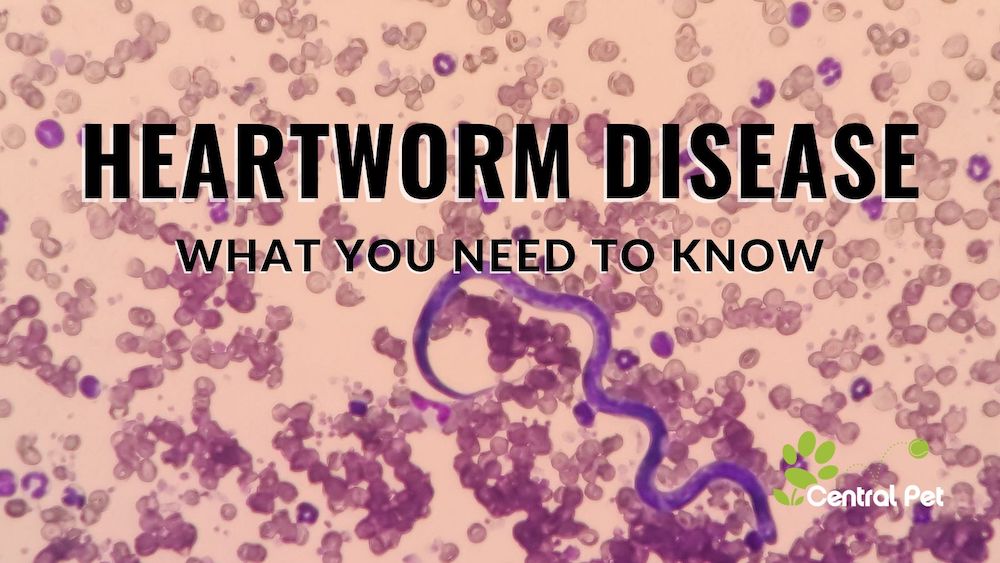Heartworm disease is a serious and potentially fatal disease in pets in the United States, with infections on the rise. But what exactly is it and how does your pet get infected? Keep reading to learn some basics regarding heartworm disease.
What is Heartworm Disease?
Heartworm disease is caused by the parasite Dirofilaria immitis--a type of worm that lives in the heart, lungs and associated blood vessels of affected pets. These foot-long worms, more commonly referred to as heartworms, can cause severe lung disease, heart failure, and even damage to other organs in the body.
Heartworm disease in dogs is different than it is in cats. But even though there are differences, it’s important to understand that it doesn’t make the disease any less serious.
Heartworm in Dogs
Dogs are a natural host for heartworms. This means heartworms living within a dog can go through an entire life cycle, from birth to adulthood, where they will then mate and produce offspring. The more adult worms develop, the more likely they will obstruct blood flow to the heart, resulting in heart-related issues. Without treatment, the number of heartworms will continue to multiply, causing further damage to your dog’s health.
Heartworm in Cats
Cats, on the other hand, are atypical hosts for heartworms, meaning most worms do not survive to the adult stage. Whereas dogs can have several adult heartworms in them, cats typically have very few. Even still, this can be very dangerous for your cat. Not only can immature heartworms cause just as much damage as mature worms, but they are also much more difficult to identify. Rather than causing heart-related issues as in dogs, heartworms typically affect a cat’s lungs in the form of a condition known as heartworm-associated respiratory disease (HARD).
Transmission of Heartworm Disease
Heartworms can only be transmitted from animal to animal by mosquitoes. When a mosquito bites an infected animal, young heartworms, called microfilariae, enter the mosquito's system. Over the course of about two weeks, these microfilariae develop into infective larvae. When the mosquito takes its next blood meal, the infected larvae can be transmitted to another animal. Any pet capable of being bitten by a mosquito runs the risk of becoming infected.
Heartworms in Arizona
Although the incidence is low, there are heartworm infections in Arizona. It’s important to understand that different climates exist within the state, including micro-climates such as backyard ponds, irrigated fields, and manmade golf courses. Combined with the amount of traveling people do with their pets, there is definitely an impact on the duration and severity of the mosquito season.
Symptoms of Heartworm Disease
Many of the initial symptoms of heartworm disease can easily be overlooked by pet owners or attributed to other factors, such as cold or flu, overexertion, or an upset tummy.
Common symptoms of heartworms in dogs typically include:
- Mild cough
- Reluctance to exercise
- Fatigue after moderate activity
- Decreased appetite
- Weight loss
As the disease progresses, dogs may develop heart failure and the appearance of a swollen belly, which is caused by excess fluid in the abdomen.
Common symptoms of heartworms in cats can include:
- Coughing
- Asthma-like attacks
- Periodic vomiting
- Lack of appetite
- Weight loss
Sometimes, cats may experience fainting or seizures, have difficulty walking, or accumulate fluid in the abdomen.
If your pet displays these symptoms, the quickest way to rule out heartworm disease is through a blood test through your veterinarian. These tests take only a matter of minutes to run and, depending on the results, may require further assessment of the diagnosis via additional laboratory testing and cardiac ultrasounds. Once the severity of the infection is known, your vet will move forward with heartworm treatment.
Protect Your Pet Through Prevention
Prevention, rather than treatment, is often the best and sometimes only option there is. At this time, dogs can receive a series of intramuscular injections to help treat heartworms, which can be both, time-consuming and expensive. Cats, however, can’t be treated at all as there are currently no approved treatments available for them. Furthermore, because this disease is so aggressive, there are potential risks involved in treating it. This is why prevention is often the best option.
Fortunately, there are easily accessible and effective options to help you prevent heartworm infection in your pet. Whether you prefer oral, topical, or injectable medications, there is a medication that fits your needs. These medications protect your pets from other internal parasites as well, some of which are highly contagious and easily spread to other pets. Talk to your veterinarian about your concerns and the best course of action for you and your pet to ensure they live a long and happy life.
Originally published in June 2018. Updated May 2019.






